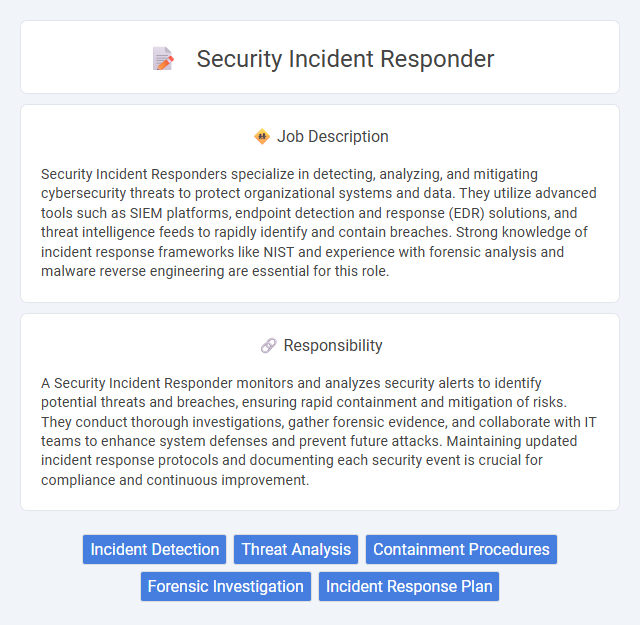
Security Incident Responders specialize in detecting, analyzing, and mitigating cybersecurity threats to protect organizational systems and data. They utilize advanced tools such as SIEM platforms, endpoint detection and response (EDR) solutions, and threat intelligence feeds to rapidly identify and contain breaches. Strong knowledge of incident response frameworks like NIST and experience with forensic analysis and malware reverse engineering are essential for this role.
Individuals with a strong analytical mindset and the ability to remain calm under pressure are likely suitable for a Security Incident Responder role. Candidates who thrive in fast-paced environments and possess keen problem-solving skills could find this job aligning well with their strengths. Those who struggle with high-stress situations or lack attention to detail may face challenges adapting to the demands of the position.
Qualification
Security Incident Responder candidates must possess strong expertise in cybersecurity, including proficiency with SIEM tools, intrusion detection systems, and malware analysis. Certifications such as CISSP, CEH, or GIAC GCIH are highly valued to demonstrate advanced knowledge in threat identification, incident handling, and forensic investigation. Experience with incident response frameworks, network protocols, and vulnerability assessment tools enhances the ability to effectively mitigate security breaches and minimize organizational risk.
Responsibility
A Security Incident Responder monitors and analyzes security alerts to identify potential threats and breaches, ensuring rapid containment and mitigation of risks. They conduct thorough investigations, gather forensic evidence, and collaborate with IT teams to enhance system defenses and prevent future attacks. Maintaining updated incident response protocols and documenting each security event is crucial for compliance and continuous improvement.
Benefit
A Security Incident Responder likely enhances an organization's ability to quickly detect and mitigate cyber threats, reducing potential damage and downtime. Their expertise probably improves incident response times, minimizing data loss and financial impact. Employing a dedicated responder may also boost overall cybersecurity posture and compliance with regulatory standards.
Challenge
Security Incident Responder roles may frequently encounter complex and rapidly evolving cyber threats that demand quick decision-making under pressure. The challenge likely involves accurately identifying the root cause of incidents while minimizing damage and downtime. Staying up-to-date with emerging attack vectors and maintaining effective communication with cross-functional teams could be critical for success.
Career Advancement
Security Incident Responders play a critical role in detecting, analyzing, and mitigating cyber threats to protect organizational assets. Mastery in threat intelligence, incident management frameworks, and advanced forensic tools significantly enhances career prospects, leading to senior roles such as Incident Response Manager or Cybersecurity Operations Lead. Continuous certifications like CISSP, GCIH, and evolving expertise in automation and AI-driven security solutions accelerate advancement within cybersecurity career paths.
Key Terms
Incident Detection
Security Incident Responders specialize in incident detection by continuously monitoring network traffic, system logs, and threat intelligence feeds to identify signs of malicious activity or policy violations. They employ advanced detection tools such as Security Information and Event Management (SIEM) systems, intrusion detection systems (IDS), and behavioral analytics to rapidly pinpoint security breaches. Their expertise in correlating disparate data sources ensures accurate and timely identification of cyber threats, facilitating immediate containment and mitigation efforts.
Threat Analysis
Security Incident Responders specialize in threat analysis by identifying, assessing, and mitigating cybersecurity threats through advanced monitoring tools and techniques. They analyze malicious activities, trace attack vectors, and develop response strategies to prevent breach escalation and data loss. Expertise in real-time threat intelligence, forensic analysis, and incident containment is critical for minimizing organizational risk and ensuring swift recovery.
Containment Procedures
Security Incident Responders implement containment procedures to isolate affected systems and prevent the spread of cyber threats within organizational networks. They utilize segmentation and access controls to quickly limit attacker movement and preserve critical assets. Effective containment minimizes operational disruption and supports forensic analysis for subsequent eradication and recovery phases.
Forensic Investigation
Security Incident Responders specialize in forensic investigation by meticulously analyzing cyberattack traces to identify breach origins and tactics. They utilize advanced tools like EnCase and FTK to recover and preserve digital evidence, ensuring chain of custody integrity. These experts collaborate closely with threat intelligence teams to correlate findings and strengthen organizational defenses against future incidents.
Incident Response Plan
A Security Incident Responder ensures the effective implementation and continuous improvement of an Incident Response Plan to swiftly identify, contain, and mitigate cyber threats. They coordinate cross-functional teams to execute predefined protocols, minimizing damage and recovery time during security breaches. Detailed documentation and post-incident analysis drive enhancements in security posture and compliance with regulatory standards.
 kuljobs.com
kuljobs.com